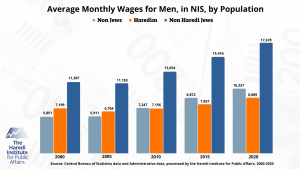The current year opened with resounding headlines: an unprecedented employment rate for the Haredi men, unseen for several decades, which stands at 53%. That is, more than half of all Haredi men work. Indeed, in the last 20 years the employment rate of Haredi men has been on a slow but continuous upward trend. However, other trends in the employment of different male groups present a more troubling picture. From the recently published Bank of Israel report data, it appears that the rate of academics among Haredi men is on the decline, and that there are large wage gaps between Haredi academics and non-Haredi academics.
Data processing by the Haredi Institute for Public Affairs shows that there is a relative downgrade in the wages of Haredi men in Israel. In those 20 years of a continuous increase in the employment rate, the wage gap between Haredi men and non-Haredi Jewish men is in the exact opposite direction: in 2000, the wage gap between a non-Haredi Jewish man and a Haredi man was 36%. Today, it stands at 49%. The wage gap is also in line with employment trends: since 2015, the employment rate of Haredi men has stabilized at around 50%, and with it came a stabilization of the wage gap at around 49%.

True, more and more Haredi men are entering the labor market in Israel, an important development for the economic future of Jewish society in Israel. But it seems that the massive actions that are being taken to make this happen – whether these are economic sanctions and benefit cuts or allocation of budgets for guidance, diagnosis and training – are causing Haredi men to be “pushed” into the labor market in an incorrect and ineffective way. Is this what we want to see? Tens of thousands of Haredi men working, at any cost? Are we using the right tools to encourage and enable quality employment of Haredi men?
In the state budget that is being approved these days, there are signs of good news, since for the first time in a long time the topic of professional training is put on the table, after many years of investment only in academic education. There is an understanding that the Haredi population behaves differently in the labor market, and needs systems and tools adapted to its characteristics and needs.
When it comes to the integration of Haredi into the Israeli systems, whether in the economy or the security system or in any other field, creativity and thinking outside the box are required. This is to allow a real and important response to the needs of the Israeli systems, on the one hand, and on the other hand – to allow the public with different characteristics, values and life path to integrate into those systems.
The adaptation of the tools and means for entry into quality employment for the Haredi population does not come from a perception that Haredi society deserves special treatment and excess budgets. It comes from an understanding that Israeli society is complex and diverse. In order to allow all the groups that make up our human mosaic to live and exist together, we need to understand and respect the characteristics and values of the different populations and give them adapted tools, in terms of quality and not quantity.
We must also remember the inter-community responsibility of the Haredi sector: given the fact that today every second Haredi man works, whether he does so alongside studies in the Kollel or without them, the community as well as the state have an obligation to provide basic tools that will allow a graduate of the Haredi education system to provide for his home.
It is necessary to produce adapted modular tools that will enable the acquisition of knowledge and skills required for the labor market, both inside and outside the education system, in a flexible and adapted manner. However, there is a clear understanding that the government work programs require a broad, comprehensive, creative and adapted rethinking of the issue of the employment of Haredi men, so that we can see their optimal integration into the labor market. One can start with research to evaluate the effectiveness of existing programs and initiatives, identify areas for improvement and develop more effective strategies and adjust future budgets and efforts.
Yehudit Miletzky is head researcher in the field of employment at the Institute, and specializes in education and employment in the Haredi community, from gender-based, community-based and geographical perspectives.
The article was published in Hebrew in TheMarker on 21 April 2023

